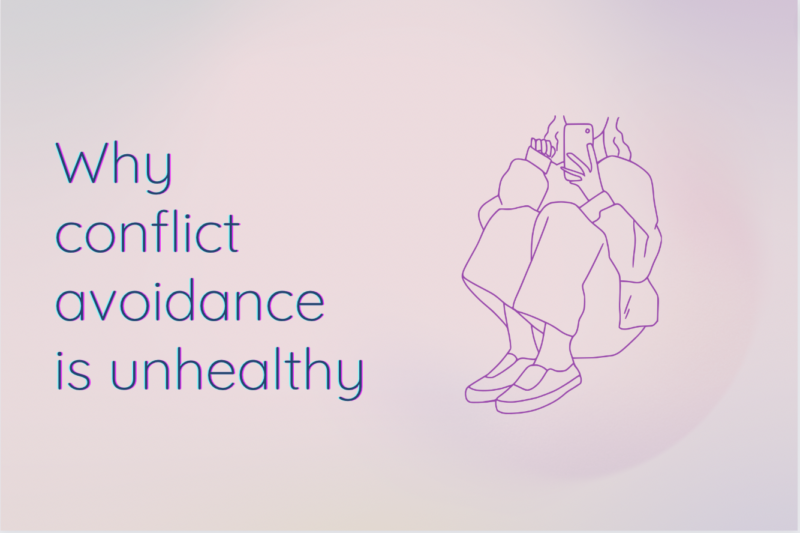Why Conflict Avoidance is Unhealthy
by Roamers Therapy | May 2023
Sometimes clients come into sessions expressing that they are non confrontational and that they do not express frustration until it becomes too burdensome for them to carry. If we find ourselves relating to these clients, we may be conflict avoidant. People often think they are doing themselves and others a favor by holding in their emotions, thinking that it’s a good way to prevent conflict. Not expressing our emotions may indeed prevent conflict in a given moment, but avoidance can compromise our mental health and negatively impact our professional and personal relationships in the long run.
Conflict avoidance can present in a number of ways. Some try to ignore feelings of unease while others may only allow themselves to feel discomfort internally without saying anything externally. For example, if someone at work said something bothersome, you may avoid expressing how it made you feel and retreat into your own space to process your feelings. Usually, when others voice their concerns, people that are conflict avoidant shut down and disengage from the conversation.
For many people, conflict avoidance is a way to evade backlash. There is a fear that expressing one’s emotions equals getting fired, losing a friend, or being judged. Avoiding conflict may calm some of those fears and the anxiety we may feel about voicing our truth, but it is not a long-term solution.
When we find ourselves relieved temporarily but even more frustrated overall, we create a cycle. Conflict avoidance is a suppression of emotions, making us more prone to experiencing emotional outbursts. When we avoid conflict, there are truths that we prevent ourselves from speaking on and these truths can pile up until they manifest themselves externally. The emotions we suppress may show up in the form of an emotional outburst, increased anxiety, or resentment and they are often directed at the person or group you were initially avoiding conflict with.
Rather than viewing conflict as something to fear or hide away from, challenge yourself to view conflict as an opportunity for growth and change. Reconsider your current perspective on conflict and assess where your fears of confrontation stem from. Recognize that previous experiences with conflict do not determine how conflict will unfold in future situations. There are healthy ways of engaging in conflict. It is important to be open and honest about your thoughts and emotions in a calm manner. Confronting a problem allows you to share your perspective with another person as well as learn from others. This open communication allows for positive growth individually and within the relationship.
At Roamers Therapy, our psychotherapists are here to support you through anxiety, depression, trauma and relationship issues, race-ethnicity issues, LGBTQIA+ issues, ADHD, Autism, or any challenges you encounter. Our psychotherapists are trained in Cognitive Behavioral Therapy, Dialectical Behavioral Therapy, Psychodynamic Therapy, Acceptance, and Commitment Therapy, Person-Centered Therapy, and Gottman Therapy.
Whether you’re seeking guidance on a specific issue or need help navigating difficult emotions, we’re ready to assist you every step of the way.
Contact us today to learn more about our services and schedule a session with our mental health professionals to begin your healing journey. To get started with therapy, visit our booking page.
First, decide if you’ll be paying out-of-pocket or using insurance. If you’re a self-pay client, you can book directly through the “Book Now” page or fill out the “Self-Pay/Out-of-network Inquiry Form.” If you’re using insurance, fill out the “Insurance Verification Form” to receive details about your costs and availability. Please let us know your preferred therapist. If your preferred therapist isn’t available, you can join the waitlist by emailing us. Once your appointment is confirmed, you’ll receive intake documents to complete before your first session.
This page is also part of the Roamers Therapy Glossary; a collection of mental-health related definitions that are written by our therapists.
While our offices are currently located at the South Loop neighborhood of Downtown Chicago, Illinois, we also welcome and serve clients for online therapy from anywhere in Illinois and Washington, D.C. Clients from the Chicagoland area may choose in-office or online therapy and usually commute from surrounding areas such as River North, West Loop, Gold Coast, Old Town, Lincoln Park, Lake View, Rogers Park, Logan Square, Pilsen, Bridgeport, Little Village, Bronzeville, South Shore, Hyde Park, Back of the Yards, Wicker Park, Bucktown and many more. You can visit our contact page to access detailed information on our office location.

